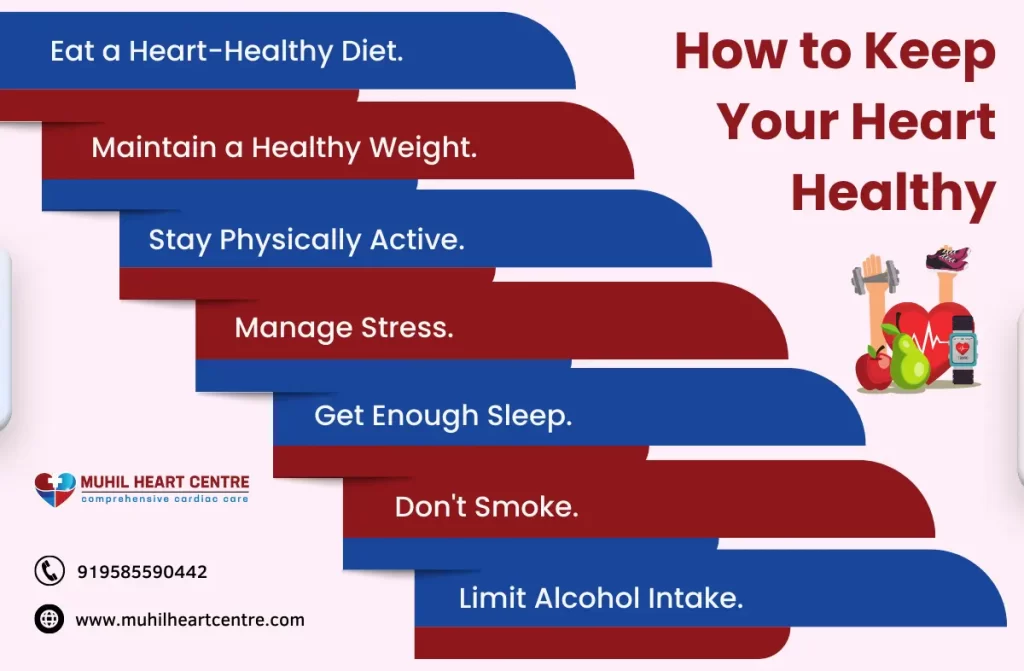Sustaining a robust heart is fundamental for overall health and wellness. Your heart works tirelessly to pump blood throughout your body, and taking care of it can significantly reduce the risk of heart disease and other cardiovascular issues. In this blog post, we’ll explore effective ways how to keep your heart healthy and provide actionable tips on how to maintain heart health.
Understanding Heart Health
Your heart’s health is closely tied to various factors. You can keep your heart healthy by including lifestyle choices, diet, exercise, stress management, and genetics. By adopting heart-healthy habits, you can improve your cardiovascular fitness and reduce the likelihood of heart-related problems.

How to Keep Your Heart Healthy
Prioritize a Balanced Diet
A nutritious diet plays a crucial role to keep your heart healthy. Focus on:
- Consuming a variety of fruits and vegetables rich in antioxidants, fiber, and essential vitamins.
- Choosing whole grains over refined grains for sustained energy and improved cholesterol levels.
- Opting for lean proteins like poultry, fish, legumes, and nuts.
- Reducing saturated and trans fats found in fried foods, fatty meats, and processed snacks.
- Minimizing salt intake to manage blood pressure as this can help us know how can we keep your heart healthy.
- Limiting added sugars and sugary beverages that contribute to obesity and inflammation.
Regular Exercise
Physical activity is key to maintaining a strong cardiovascular system:
- Engage in aerobic exercises like brisk walking, jogging, cycling, or swimming to improve heart and lung function.
- Incorporate strength training to build muscle mass and enhance metabolism especially while considering how to keep your heart healthy.
- Strive to engage in a minimum of 150 minutes of moderate-intensity aerobic activity every week, distributed over multiple days.
- Consult your doctor before starting a new exercise routine, especially if you have existing health conditions.
Manage Stress
Chronic stress can negatively impact heart health. Implement stress management techniques to keep your heart healthy. They are:
- Practice mindfulness, deep breathing, and meditation.
- Partake in activities you find enjoyable to unwind and find relaxation.
Maintain a Healthy Weight
Keep your heart healthy by focusing on gradual, sustainable weight loss:
- Combine a balanced diet by exercising regularly in order to achieve and maintain a healthy weight.
- Set realistic goals and celebrate your progress if you have ever wondered how we can keep your heart healthy.
Get Adequate Sleep
Prioritize quality sleep for overall health and heart well-being:
- Establish a consistent sleep schedule to keep your heart healthy.
- Create a comfortable sleep environment.
Stay Hydrated
Drinking water supports heart health and overall bodily functions:
- Consume water as required throughout the day.
- Limit sugary and caffeinated beverages when you get a thought about how can we keep your heart healthy.
Avoid Smoking and Limit Alcohol
Quitting smoking and reducing alcohol consumption can have profound effects on heart health:
- Smoking damages blood vessels and increases the risk of heart disease. Seek support to quit to keep your heart healthy.
- If you drink alcohol, do so in moderation. For women, this means up to one drink per day; for men, up to two drinks.
Steps to Keep Your Heart Healthy
Maintaining a healthy heart involves adopting lifestyle practices that support cardiovascular well-being. Here are key steps to keep your heart healthy:
Eat a Balanced Diet:
Prioritize a diet rich in fruits, vegetables, whole grains, and lean proteins, while also incorporating healthy fats. Conversely, restrict intake of saturated and trans fats, cholesterol, sodium, and added sugars.
Engage in Regular Exercise:
Strive to engage in a minimum of 150 minutes of moderate-intensity aerobic exercise or 75 minutes of vigorous-intensity exercise per week. Include activities that elevate your heart rate and strengthen muscles.
Maintain a Healthy Weight:
Achieve and sustain a healthy weight through a combination of balanced nutrition and regular physical activity. Consult with healthcare professionals for personalized weight management guidance.
Quit Smoking:
Smoking is a major risk factor for heart disease. Explore assistance to quit smoking and enhance heart health. Utilize smoking cessation programs, medications, or support groups.
Limit Alcohol Intake:
Consume alcohol in moderation, if at all. Women are advised to limit alcohol consumption to up to one drink per day, while men are recommended to consume up to two drinks per day, according to general guidelines for most adults.
Conclusion
To conclude, taking care of your heart is a lifelong commitment. By adopting a heart-healthy lifestyle that includes a balanced diet, regular exercise, stress management, and other positive habits, you can significantly reduce your risk of heart disease and enjoy a healthier, more vibrant life. Consult with healthcare professionals for personalized guidance on how to keep your heart healthy. Remember, every small step you take toward heart health makes a big difference in the long run.


